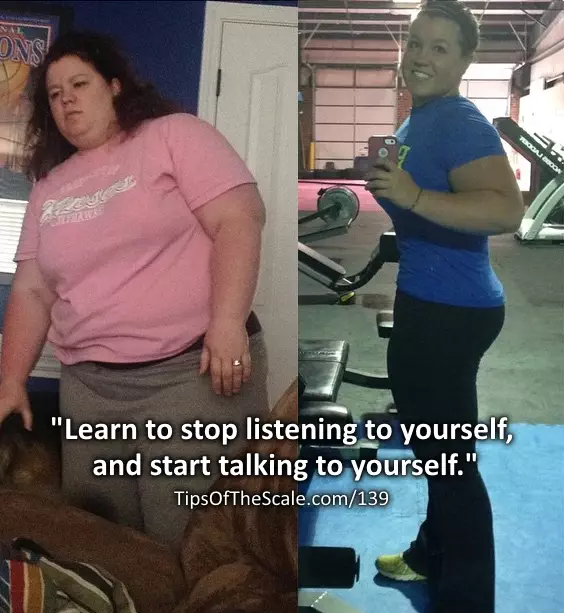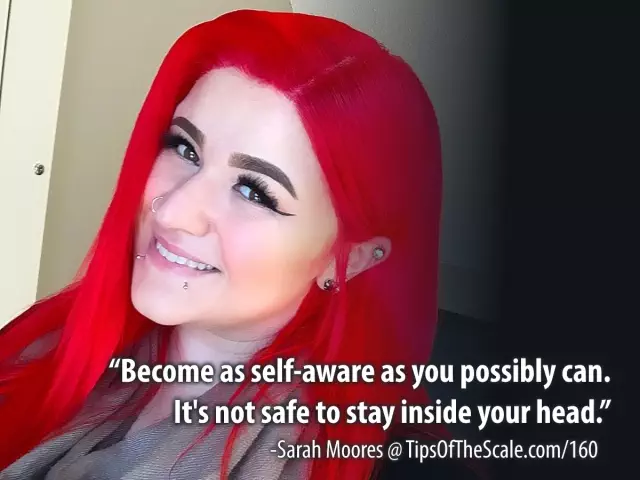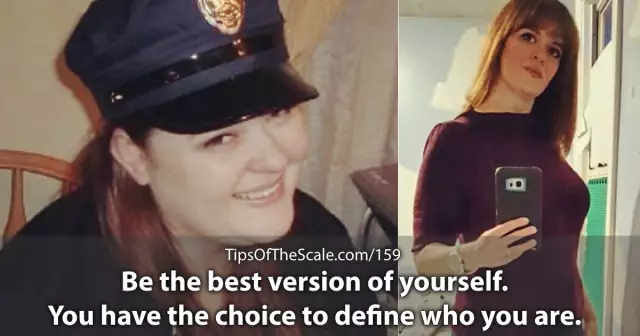Elizabeth came from years of food obsession and confidence-robbing emotional issues. Hear how self-acceptance and a change of perspective helped her drop over 130 pounds.
“Learn to stop listening to yourself, and start talking to yourself.”
Elizabeth says that she puts this quote into practice multiple times every single day to motivate herself. This quote reminds her that she is not a passive observer in her life, rather that she is the person who records the tape that plays in her own mind, and that she herself can and should fill her mind with positive and empowering thoughts.
Weight Gain Background and Contributing Factors
Elizabeth was born heavy in a family of tall, thin, fit people. She thinks of it as being born “metabolically disadvantaged.”
Because Elizabeth carried extra weight as a child, her mother was restricting Elizabeth’s food from an early age. Elizabeth shares that from early in life she learned that there were “bad” and “good” foods, and shame around food began at an early age for her.
As a rebellion against this strictness, Elizabeth says she began hoarding and sneaking food before she was in elementary school. Elizabeth recalls when she was young secretly taking candy from her mom’s co-worker’s desk and stealing quarters from her dad’s change jar to get snacks from a vending machine.
How Being Overweight Impacted Elizabeth’s Life
 Elizabeth says she grew up in an active, overachiever family, and early on she learned to use humor to deflect attention from her weight. She says that growing up she always felt like jokes at her expense were going to come anyway, so she might as well control the situation.
Elizabeth says she grew up in an active, overachiever family, and early on she learned to use humor to deflect attention from her weight. She says that growing up she always felt like jokes at her expense were going to come anyway, so she might as well control the situation.
While Elizabeth stayed active in varsity sports throughout high school, she says she always felt like she needed to apologize for her weight—to coaches, to family members, to boyfriends. Looking back and discussing how her life might have been different at this time had she been thin, Elizabeth says she feels like her mom would have been proud of her “no holds barred.”
“Well intentioned” words from her mom always gave the sense that Elizabeth wasn’t quite enough or wasn’t as awesome as she could potentially be. Elizabeth says that some of those feelings and messages from the past are still with her today, and that now she jokes around with her mother about how if ‘Oprah still had a couch,’ Elizabeth would definitely be visiting it.
“I know how isolating obesity can be.”
Obesity gave Elizabeth a feeling of self-hatred and despair. Over the years she tried countless different diets: South Beach, HCG, The Zone, Weight Watchers, Atkins, and even taking laxatives and phentermine… For a few months she ate only chicken broth and protein shakes.
Elizabeth says she was always searching for “the magic bullet” to lose weight. After all these diets, Elizabeth says she would eventually fall into her same old pattern of eating, because she hadn’t dealt with the stuff that was “in her head.” Sam discusses that these include some of the most challenging diets to stick to, showing that lack of will wasn’t at all the problem Elizabeth was dealing with, rather something else at the root of the obesity.
“…anybody can white knuckle a dietary change for a week, two weeks, or even a month. But if you don’t have success in your head first and in your heart second, then, really, what you put in your mouth or how much you move your body is only going to carry you so far.” –Elizabeth
Elizabeth relates her theory that even if someone loves food, it is probably not just food that can get a person to weighing over 300 pounds (136.4 kg), but it’s also an accumulation of mental and emotional things. Elizabeth says: “I had been the queen of knowing all the low-calorie foods.”
She studied nutrition in college with a passion and says nutrition was “the most important thing in my life, and yet—I was over 300 pounds.” She says in her late 20s she began to get a grip on all these topics.
The Turning Point
Shortly after Elizabeth got married, she and her husband paid off a $130,000 loan. Her career was very successful. And yet, one day sitting in her car at a stoplight, she was thinking how all those things were great but what she really wanted was to lost weight. In fact, that’s what she had always wanted.
Looking back, she says she would describe her life at that point as “a total lie,” because while she was very successful professionally she was totally miserable in her obesity every second of every day.
“Obesity, or any weight struggle is one of the most isolating things in the world.”
At her stoplight epiphany, Elizabeth says she realized that thinking back on other diets, she knew that her discipline and motivation were present and ready but it just finally struck her that someone else’s plan was not going to work for her, as it never had before. She decided to make up her own eating plan.
Starting The Weight Loss Journey
Closely examining her mindset, Elizabeth explains she realized at the time that: “I didn’t want to further my obsession with food in any way.”
She decided that for 6 days each week she would eat only whole foods, and on the 7th day she would eat whatever she wanted. Elizabeth didn’t want to have to count calories, but she allowed herself any whole food she wanted, and she focused on eating foods that she loved—if she wanted multiple avocados, she ate multiple avocados.
She began to write down every food she was craving on a note in her phone during the 6 days, and on the 7th she could decide if she wanted to eat it. Then, she ate what she wanted with no self-judgment on the 7th day.
Elizabeth utilized this system for the first 50 pounds (22.7 kg) of her weight loss. Eventually Elizabeth didn’t feel the need for the 7th day (her day off) any longer, as the foods she would tend to eat on that day made her feel “kind of gross.”
Physically she became more addicted to the progress and the pride she felt in herself rather than the food. Elizabeth says that food had been “a medication” for her, and she reached a point where that same food didn’t make her feel good.
Elizabeth didn’t really share the fact that she was starting a new eating plan at the beginning. She says her friends and family were all so used to the fact that she was perpetually dieting and always unhappy with her weight.
Elizabeth thinks obesity is particularly painful since it is an area in life that can make a person feel inadequate in all other areas of their life. Instead of tying self-worth to achievement, Elizabeth works instead to celebrate things as they are right now, and stay in the moment. Sometimes she will tell herself “these are 3 great things that happened today” and compose one statement about herself—‘I improved my deadlift,’ for example.
Staying Motivated
Elizabeth journals a lot, and even dictates notes when she is driving. She keeps index cards full of personal mantras that she repeats to herself throughout the day. Using this technique, Elizabeth “leads herself” by talking to herself in a positive way, which becomes the tape your brain hears, instead of whatever negative messages may linger from years ago.
Elizabeth says it’s easy to fall into lying to yourself like: ‘I’ve been so strict for so many weeks that I deserve a cheat day.’
Instead, she works to identify what is motivating her to have that feeling and think about it, rather than reaching for food as a distraction from thinking about it. Raising awareness about things like this helps her to stay on track. She likes to find another way to either acknowledge her feelings or strategize another way to deal with her current emotion/problem.
Helping Others
Elizabeth discusses that 2 things predominate when folks run into trouble and fail on an eating plan.
1: Willpower is finite. If you think of willpower like a rubber band, you know that if you stretch it too far and ask it to handle too many new lifestyle changes at once, it’s power is limited, and it will eventually break.
2: Food restriction triggers survival mode in which the body makes it harder to drop weight by conserving calories, since the body thinks it is starving. And after severe restriction when you then shift back to “normal” eating, your body then guards those calories ever more closely, and you have further damaged your metabolism in the process.
When dealing with these issues, Elizabeth advises others to find someone to help you who may have dealt with the same problems as you have in your own past. Elizabeth feels that her “very dark journey” helps clients she works with every day.
What Elizabeth Learned About Food, Exercise, and Herself
Elizabeth says she would have “slapped herself” for saying so a few years ago, but now she vehemently thinks: “Trying to do more will backfire.”
Elizabeth shares how a ‘minimum effective dose’ of change is critical. Your body will adjust to whatever changes you make, so give yourself some room to choose something easy for you to do, let it become effortless, THEN make a further change, instead of going guns blazing from the start.
Always leave yourself some room you can go to, whether with food or exercise, as “trying to go faster doesn’t get you there faster.”
Elizabeth says the most important way she is different now than she was before is that she is much more aware of herself and her feelings. She says that in the past she hid by using food and humor. Now she tries to pay attention to her thoughts and emotions, and to be present for them.
“It’s the mental obstacle that’s really holding people back.”
Elizabeth’s Advice For Your Journey
“You don’t have to start with everything at once.” (Pick the easiest obstacle first and tackle that one.)
Elizabeth also encourages others to stop looking for answers outside yourself, or what she calls “analysis paralysis.”
If you use a food journal, Elizabeth encourages you to write down not only what you eat but how it makes you feel, since what foods help a body are completely individualized. “Be your own detective!”
And, keep up with tracking, as your body will change over time.
“Honestly I think that people should move away from…wanting to learn more, and move towards wanting to do more.”
You don’t find motivation, you create motivation. You have to seek it every day.
Resources Discussed In This Podcast
- Your own food journal — Elizabeth says that will contain 99% of the information you need
- Wheat Belly by William Davis [ Amazon / iTunes ]
- Eat the Yolks by Liz Wolfe [ Amazon / iTunes ]
On Elizabeth’s Workout Playlist
Contacting Elizabeth
- Website: PrimalPotential.com
- Facebook: fb.com/PrimalPotentialFatLoss
- Twitter: @PrimalPotential
- Email: elizabeth [at] primalpotential [dot] com







You must be logged in to view comments.